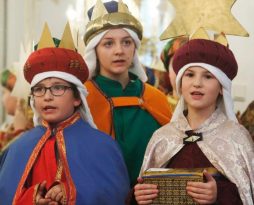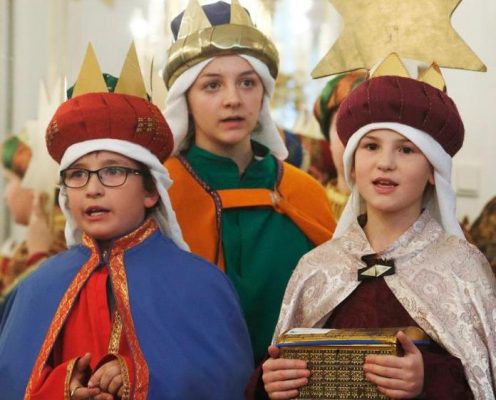By Father Herb Weber
The small plane flew to the Atlantic coast of Panama, stopping on a landing strip at water’s edge. I was on that plane with my sister and brother-in-law, visiting the Kuna people of the San Blas Archipelago.
Although the people were very friendly, they were shy and retiring, reluctant about having pictures taken. When a group of women, however, learned that I was a Catholic priest, they became engaged.
All of the members of this particular group were Catholic. They walked me to their unpainted wood-framed church, which they proudly displayed to me. They were even willing to have a photo taken with me, honoring the occasion of my visit.
httpv://youtu.be/g4FSvRbNlR4 My sister later accused me of playing the priest card to ingratiate myself with the Kuna. Of course, I denied it, but what I did was let them know that, North American or Central American, we shared the commonality of faith. It inspired them and truly reminded me of the universality of our faith and church.
The Feast of the Epiphany is a perfect time to reflect on a universality of faith. In the U.S. Catholic Church, this day begins National Migration Week (Jan. 6-12). In light of everyday news about immigrants and refugees, there is a need to reflect prayerfully on a humanitarian response to those leaving their home countries for safety purposes.
That, however, requires people to reflect on the common bond that all humans have, regardless of point of origin, language or ethnicity.
The response for the Mass on the Feast of Epiphany, is “Lord, every nation on earth will adore you,” taken from Psalm 72. This not only expresses the universal manifestation of God’s salvation to all people of the world. It also depicts all nations finding the same awareness of God’s goodness and love.
Put another way, it means that we adore God who loves all people. As such, we need to love and show respect for all people.
Perhaps the Kuna women warmed up to me because they discovered that bond of the Catholic faith. The same “warming up” has to be present regardless of faith, denomination or religion. All people are loved by God. People of all nations are to praise God. And, perhaps most important, we need to realize we are bonded with everyone.
Understanding a universality of humanity — that human bond — leads to two seemingly opposite thoughts.

First of all, people have to discover similarities with others. Admitting that people of other backgrounds have something in common with us is a major step toward bringing people together.
I feel I have been blessed not only in traveling to other countries, but also to have known immigrants personally. When Miguel fled El Salvador during that country’s civil war, he resided with me for more than a year. After the war ended, he was fearful about returning to his home.
Consequently, I offered to go with him, spending more than a week in his remote village that can hardly be found on a map. When Miguel was at my parish in Ohio, he was accepted and loved. I felt the same thing with the people in the mountains of El Salvador: the oneness of our humanity.
I witnessed that Miguel and his family had the same love for each other that I had experienced growing up. And when I celebrated Sunday Mass with the community, something that was rare for the people, I also knew that God’s grace does not stop at national borders.
Sadly, as one studies various genocides that have taken place throughout the world, one side is often coaxed into believing that members of the other side are less than human.
In her book, “Left to Tell,” Immaculee Ilibagiza writes about the Rwandan genocide and how she as a Tutsi was saved by a Hutu pastor who hid her and other women in a bathroom. The genocide was characterized by Tutsis being referred to as cockroaches and vermin, as opposed to being human. Such terms or attitudes are not uncommon in war as people feel a need to dehumanize others. The common bond of humanity among all people is forgotten.
The second necessary step in accepting universality is to know that, although similar in needs, humans are different. This difference, moreover, is a source of strength, not weakness.
Universality does not mean uniformity. People have differences in backgrounds and various ways of looking at life. In accepting differences, people can go beyond themselves and know they don’t have all the answers.
A devout Muslim family invited me to their house along with other Christians and Jews for a sunset dinner. The Muslims were mostly immigrants but had come from various countries in the Middle East and Africa. There was warmth in the room as each person shared some aspect of faith.
As I listened, it became incredibly clear to me that our differences did not need to drive us apart. In diversity there is also unity, a unity of understanding. That dinner reflected Psalm 72 and how every nation — in different ways — can live in God’s love and adore God’s majesty.
Father Weber is the founding pastor of St. John XXIII Parish in Perrysburg, Ohio.






















